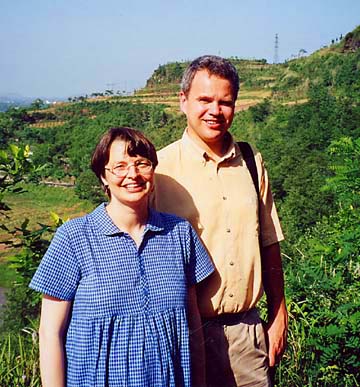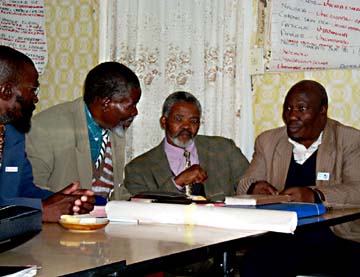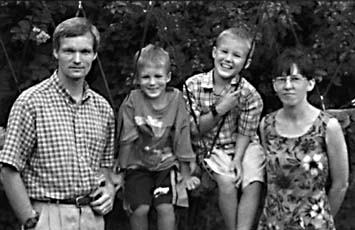Volume 7, number 2
January 27, 2003
Winnipeg, Man.
Jake F. Pauls, who is preparing for his first delegate session as executive director of Mennonite Church Manitoba in February, says it’s not an easy time to be at the helm. While exciting initiatives are happening, some programs with a devoted following are being discontinued.
It is not just the financial deficit that necessitates changes to Faith and Life programming and chaplaincy, said Pauls, but a reshaped vision and changing needs. (See story on proposed cuts in Jan. 13 issue, page 39.)
“The chaplaincy program is a luxury,” said Pauls. “It is not something we should do for the churches.”
“I think some haven’t understood the vision: not to do ministry for the churches but ministry through the churches,” said Pauls. MC Manitoba seeks to be a resource to enable churches to do their work better. The chaplaincy program had a full-time staff person and many volunteers who provided a ministry in city hospitals on behalf of rural churches.
“Faith and Life has served us well but it can’t go on financially and structurally,” said Pauls. Low German radio programming is being dropped. The churches have not met their financial commitments.
“Even though our expenses are way below budget I don’t know if we will meet them,” said Pauls. He is surprised by the devotion of some to the programs being dropped. “When over 90 percent voted in favour of adopting proposed changes they didn’t see the implications,” said Pauls.
Instead of “doing for” the churches, ministry directors are carefully discerning how they can best enable churches. The representatives meeting that has become an annual October event and the reference groups are very important to the ministry directors, said Pauls.
MC Manitoba is planning to bring the Equipping Conference into the churches. “With the five regions we want to do more things at a regional level,” said Pauls, “something like an Elim Bible Institute without walls, a portable Equipping Conference.”
The Leadership Ministry is looking for ways to provide more education for lay and professional ministry. Media ministries are hoping to provide more provocative and helpful resources beyond radio church services.
Congregations are looking for help in church planting.
“Seven congregations are in conversation with Norm Voth (director of Evangelism and Service Ministries) about not just building larger congregations, but new congregations,” said Pauls. “In the past we haven’t known how to build new congregations. Usually splits result from disgruntlement rather than willful reaching out.”
Whether because of being too large or because of seeing a need to reach out, churches are responding with interest.
Pauls sees the new programming building a stronger network of congregations and stronger churches.
“We are working towards a leaner ministry in terms of cost but more effective in terms of what it does. The camping ministry is different, but other things could be done better through the churches.”
—Evelyn Rempel Petkau
New name for joint publishing ministry
Winnipeg, Man.
A new name has been approved for the publishing ministry of Mennonite Church Canada and USA. Mennonite Publishing House will become Mennonite Publishing Network on February 1.
In early December, the interim MPH board approved the new name and the Joint Executive Committee (JEC) ratified the decision. In doing so, they heeded the transformation plan submitted by a joint denominational task force in October that incorporated feedback from constituents, including business, ministry and education.
Constituents want the publishing network to provide materials that equip the church to share the gospel from an Anabaptist perspective in collaborative projects, said Jim Harder, secretary-treasurer of the interim MPH board and JEC member from Bluffton, Ohio.
“In making this shift from the word ‘house’ to ‘network,’ we hope to move from less of an agency mentality to more of a collaborative mode,” said Harder. “This shift sees constituents not only as users and customers, but also as co-creators and advocates when appropriate.”
It is hoped that the name shift will be completed by the time a new board is in place in the summer. Current names in use by MPH—Herald Press, Faith and Life Resources and Provident Bookstores—will be maintained.
The name shift brings a shift in philosophy and strategy that can strengthen relationships across the church.
“I am very supportive of this new direction, which I believe will really put the publishing ministry in touch with people in the pews and in area conferences,” said Ervin Stutzman, interim board vice chair and moderator of MC USA.
Henry Krause, MC Canada moderator and JEC member of Langley, B.C., said, “Whether it be in publishing, missions or education, we need to work together between Canada and the United States. We need to learn to collaborate in using our gifts, because we can’t afford to do things on our own.”
Networking can also build bridges to other denominations and Anabaptist publishers, Harder said, such as the Brethren in Christ and Church of the Brethren. “We also hope to be in conversation with some smaller independent printing and publishing operations that have connections to the church.”
These changes also signify a shift to more positive days for the troubled publishing ministry, JEC members believe. MPH is seeking to retire a $5.1 million debt through fundraising and cost reductions, including cutting 57 positions. MPH closed its printing press division in Scottdale, Pennsylvania, at the end of November.
“There is good reason to believe that MPH has turned the corner financially,” said Phil Bontrager, interim CEO. “With two months remaining in its current fiscal year, MPH is about $698,000 in net revenue ahead of where it was last year and will likely be able to end the year with an operating surplus.
The interim board and the Debt Reduction Committee said they are gratified by the congregational response to a “Barn Raising” appeal but a significant challenge remains. In the last year, MPH has received $520,000 in donations. The fund-raising appeal will continue into the spring.
“It has felt like some of the connection between publishing and the church has been lost over the years, and we hope some of that can be re-established,” said Ron Sawatsky, interim MPH board chair. “It’s my dream, too, that becoming more connected in this area will help with trust-building and connectedness in other areas of the church.”
—Joint MC Canada and MC USA release by Laurie L. Oswald
Learning language key to ministry in China
Winnipeg, Man.
Photo (Below Right): Children in China are excited to receive MCC school kits.
Photo (Below left): Jeanette and Todd Hanson
 Jeanette and Todd Hanson, Mennonite Church Canada Witness workers in China, see learning a new language as a vital part of their assignment.
Jeanette and Todd Hanson, Mennonite Church Canada Witness workers in China, see learning a new language as a vital part of their assignment.
Todd teaches English to high school and university students, and Jeannette is developing social welfare programs in partnership with Mennonite Central Committee’s Global Family Program. They serve with China Educational Exchange (CEE).
“Learning Chinese is not preparation for witnessing; it is witnessing,” said Todd. “Just wanting to learn about Chinese language and Chinese culture shows that you respect them, that you value what they value.”
One Chinese pastor told them, “If you really want to do something in China, stay here for 10 years, get to know us and then maybe we can share with each other.”
In the meantime they do what they can. Jeanette worked with Wang Hong, a government worker in rehabilitation for deaf and mute children. At first sceptical, Wang Hong has become a believer in the program funded by MCC in partnership with CEE.
“At the beginning I didn’t even believe this kind of thing was possible. But now I see progress in some of these children,” said Hong. She has taken special interest in making learning materials relevant for country families, and works hard to convince parents that they can help their children learn to speak. She was also one of 100 people chosen from all of China to study speech therapy in Beijing.
 Jeanette also helps arrange sponsorships for Chinese children to attend school, which is compulsory but also expensive.
Jeanette also helps arrange sponsorships for Chinese children to attend school, which is compulsory but also expensive.
Chen, an old man, lost all his family except two school-age granddaughters. Through CEE’s student sponsorship program, the girls are now able to attend school, and have received MCC school kits.
“You have given us hope. You have given us something for the future,” said Chen. Todd uses a curriculum oriented toward peacemaking in his classroom. Emphasizing clear communication, global citizenship, and treating others well opens some fruitful subjects. One was the September 11 attacks.
“It is either good news or bad news,” wrote one student. “The attack will arouse the United States officials to behave themselves. Maybe the United States will be kind and equal to every country. On the other hand, the U.S. will use the attack as an excuse for arms expansion. At the same time, she will use force to conquer weak countries in the name of prey of attack...more and more people will lose their lives anyhow. Common people have no alternative but to wait and bear everything that happens.”
Another wrote, “I know I felt a little happy. I still remember that the U.S. attacked our embassy in Yugoslavia on May 8, 1998.... But now, I can’t think of it only from one angle. I love peace and hate war.”
Language learning is building trust and communication both ways. One student commented: “As a language learner, I consider myself a peacemaker.” Another grateful student told Todd: “You didn’t just teach us English, you taught us to be human beings.”
— MC Canada release by Daniel Rempel
Christians determined to stem
AIDS epidemic in South Africa
Winnipeg, Man.
Photo: Students in the Bible teaching program led by Lynell Bergen and Brian Dyck. From left: Bishop Dubula, Bishop Thomas, Rev. Vuso and Bishop Mpotulo.
 After suffering through colonialism, insurrection and apartheid, South Africa now faces an AIDS epidemic that is killing an average of 5,000 people each week. But if Christians band together in a ministry of education and prevention, the deadly tide can be slowed, says a Mennonite Church Canada Witness couple serving there.
After suffering through colonialism, insurrection and apartheid, South Africa now faces an AIDS epidemic that is killing an average of 5,000 people each week. But if Christians band together in a ministry of education and prevention, the deadly tide can be slowed, says a Mennonite Church Canada Witness couple serving there.
Lynell Bergen and Brian Dyck work in Umtata, a town in the poorest region of South Africa. Here Christians are taking the lead in the fight against AIDS. According to three-year-old census data, one in five South African adults is infected with HIV, the virus that causes AIDS. One out of seven children will be an AIDS orphan by 2005.
“The government has not done well in the issues of AIDS in South Africa,” Bergen says. “All the churches are beginning to see that this is a call for them to step forward...as people with some moral authority, as people who had an active voice in ending apartheid.... In less than a year, hundreds of people in the Umtata area have received training in AIDS care and prevention.”
She adds, “It’s very miraculous and wonderful that, in our region, it is the African independent churches that are really a step ahead of everyone else.”
Patrick Ndlungwane, a co-worker, says, “We want to try by all means to drastically reduce the incidence of AIDS in our community by 2005.”
Bergen says the movement around Umtata won’t stop the spread of AIDS, “but it’s going to change the way that people interact with each other.”
“When you talk about AIDS, you’re talking about sexuality, you’re talking about relationships between men and women, you’re talking about how parents are raising their children....” People are being trained in AIDS prevention education, counselling, home-care issues and how best to deal with orphans.
“We do that very clearly from a Christian perspective,” Bergen says. “We talk about issues like faithfulness in marriage and abstinence from sex outside of marriage. We’re very clear about who we are.”
Sex is a “recreational activity” for many young people in the Transkei region, a densely populated but rural area in Eastern Cape province, the poorest region of South Africa. Young people see little future for themselves and have lost hope, Bergen says. Christians are trying to provide menial jobs and recreational activities for the youth.
Dyck and Bergen, who were on leave in Canada recently, also are involved in Bible-teaching and developing church leadership. South Africa is about 80 percent Christian. Average life expectancy is about 45 years.
“If we leave, this Bible-teaching program doesn’t continue,” Dyck says. “We’re trying to think of ways to get beyond that, to build a structure so that people can feel good about working together and taking instruction from other independent church leaders.
Meanwhile, local women are bucking tradition and are taking a more active role in the church, Bergen says.
In 1986, women from Cofimvaba formed the Umtata Women’s Theology Group, which meets regularly to study the Bible, “to dig deeper into what scripture means to them, and not just what they were hearing from the men in the front [at church services],” says Bergen.
They have written 11 Bible-study booklets for women, which are being used all over the world, according to Bergen. A group of Canadian Mennonite women recently sent the group $3,000, which may be used to translate the booklets into French for use in Benin, Congo and Ivory Coast. Topics include the role of women in the church, women in the Bible, sexuality, AIDS, marriage, parenting, singleness, divorce, aging, and dying.
Lynell Bergen and Brian Dyck serve with MC Canada Witness, Mennonite Mission Network and Africa Inter-Mennonite Mission. With sons, Samuel, 9, and Marcus, 7, they are returning to South Africa this winter.
—From MC Canada release by Charles T. Jones
Mission assignment not hard, only different
Photo: Brian Dyck and Lynell Bergen with sons Samuel and Marcus are returning to South Africa this winter.
International service “has been a real blessing in our lives, for us, for our kids.” That’s how Lynell Bergen responds to North American assumptions of hardship in their mission assignment in Umtata, South Africa.
 Life in Umtata is just fine, says Bergen. They have a comfortable home, running water, electricity, computer and internet access. (Bergen and husband Brian Dyck have their own web site at http://www.bergendyck.com.) While the services may not compare to North American standards, the Manitoba couple say life is not harder in Umtata, only different.
Life in Umtata is just fine, says Bergen. They have a comfortable home, running water, electricity, computer and internet access. (Bergen and husband Brian Dyck have their own web site at http://www.bergendyck.com.) While the services may not compare to North American standards, the Manitoba couple say life is not harder in Umtata, only different.
A recent project of Mennonite Church Manitoba camps had campers writing to Witness workers around the world. “We really got the impression that people think that mission workers have it hard, and...we’re really suffering,” said Bergen. “We don’t feel that way that all.”
“We try to communicate that as we travel around to churches,” she added, referring to their current North American visit.
Challenges abound, however. They include the local perception that white North Americans are Bible experts and the dominance of North American religious programming on South African radio and television.
One bishop said he had been taught that he “shouldn’t believe the Old Testament.” After studying with Bergen and Dyck, he says, “Now I know that I can use both books, and both have credibility.”
—From MC Canada release by Dan Dyck
MC Eastern Canada takes stock
Kitchener, Ont.
Mennonite Church Eastern Canada Executive Board, staff, commission chairs and ministry representatives met for their annual meeting at the Preston Mennonite Church on November 20. Participants formed small groups to discern common themes and vision:
•Leadership is an important theme, including developing, training, calling and supporting current and potential leaders. Increasingly, congregations are calling leaders with no related training, often with dynamic results. There is also a need for leadership training among youth.
•Diversity was noted in several ways. How do we respond to a changing world? A diversity of issues needs diverse approaches. There is also significant diversity in congregations, including the multicultural nature of MC Eastern Canada—how do we hold together in the midst of this diversity?
•Less program focused, more relational was a concern. There is a current shift of focus from structures and institutions to personal needs. There is a need for relevance and for relationships. Restructuring in this context might include more networking, instead of each commission working as an island.
•Relation of MC Eastern Canada to congregations was a theme. How does the work of the conference make an impact on congregations? How do we provide leadership and support, given our geographical vastness? There is a sense of energy and commitment to the work of the commissions.
•Stewardship is an ongoing theme, not only money matters but also stewardship of the gospel. What would our faith community look like if we were truly missional and had a good understanding of scriptures? Opportunities versus available resources is always an issue. Each of the commissions asked for only small increases; there was a hesitation to ask for more.
The plenary group addressed the key issues facing MC Eastern Canada in the next five to 10 years:
•Multiculturalism in society and in the conference.
•The need to be relevant, as MC Eastern Canada makes links with congregations, and the need to determine measures of relevancy. This includes two- way communication between conference and congregations. There is a need to be clear about why we do what we do, to ask what is our underlying focus.
•Diversity, including worship styles and understandings. At what point does diversity become fragmentation? Would it be helpful to have all congregations working on the same theme at once? There is a dichotomy between relationship and belief. How do we lead our people to read scriptures in relevant ways?
•Leadership development. Calling pastoral leaders and supporting the whole network of leaders go hand in hand. How we call leaders is a critical issue at this juncture in our church life.
The group also asked, What values should be central to our understanding of conference? Responses included:
•Identity. When family names no longer identify us, what supports our Christian Mennonite identity? Our faith statements have been central. How do we revise them? Our relationship with Christ and our ethical behaviour are perceived as two different ways of looking at what holds us together.
•Community is related to identity. Is emphasis on both community and doctrine a paradox? Purpose and identity are critical to authentic Christian community.
•Fostering leadership development in all ministries of MC Eastern Canada and aligning these ministries.
What changes might be called for in conference resources? The group called for more attention to worship and education about MC Eastern Canada for congregations. Perhaps a portion of the budget should be designated for leadership.
David Brubacher, minister to conference, reminded participants that they need to be mindful of how issues named in this meeting would be different than those named by our youth.
—Marie Burkholder and Maurice Martin
Copyright for the contents of this page belongs to the Canadian Mennonite. Please seek permission to reprint from the editor .